Somewhere in Germany, G7 conference leaders including German Chancellor Ortmann (Cate Blanchett) and US President Wolcott (Charles Dance) repair to a gazebo to collaborate on a “clear, but not so clear” communique addressing an unnamed, possibly apocalyptic crisis. Farcically human, they pocket hors d’oeuvres, flirt and pull rank, lose tempers and trousers. Meanwhile red flames lick the sky, a HAL-like sex chatbot commandeers comms, and the excavation of “bog men” - primeval leaders castrated, bound and buried by disgruntled constituents - serves as ominous warning of their power’s precarity. And in the foggy forest where the premiers soon get lost, a giant, enigmatic brain pulses.
The full-watt star presence of Blanchett’s stiffly sensual chancellor, Charles Dance’s patrician, very British president, Alicia Vikander, Nikki Amuka-Bird’s British PM and La Femme Nikita’s Roy Dupuis as Canada’s macho equivalent are unexpected developments for Rumours’ Canadian co-director Guy Maddin. So too is sharp digital cinematography wholly different from his usual distressed analogue frames. Only when Rumours dissolves into genre detours and cul de sacs, the bog people return as shambling zombie hordes, Eighties action movie tropes and smoochy sax themes accompany the end of the world and satirical archetypes slip into real anger and poignancy is Maddin’s abiding touch revealed.
Maddin’s three-decade filmography is still best encapsulated by The Heart of the World (2000), a six-minute splicing of Jesus, the End of Days and Metropolis. Glowing nitrate-like frames crash and burn as cinema on the cusp of sound and a silver thread of super-charged melodrama collide and spark in accelerated wonder. Intertitles frequently cry “KINO” – German for “cinema” – as if Maddin has imbibed the medium’s essence, though fizzing, dizzy energy belies such loftiness.
Rumours is Maddin's thirteenth feature, amid prolific shorts, installations, collages and writings. Since 2010, he has worked with Rumours’ co-writer/directors and fellow Winnipeggers Evan and Galen Johnson (pictured below left and right with Maddin). The trio meet me in a tucked-away, Thames-side hotel during the London Film Festival. Maddin is warmly bear-like and affably witty for an avant-garde eminence grise, reflecting his antic, curious work. Evan Johnson is also brightly funny, with sibling Galen of similar but more reticent mind, as they discuss fatally limiting terms of office, autobiography, artifice and the joys of getting lost.
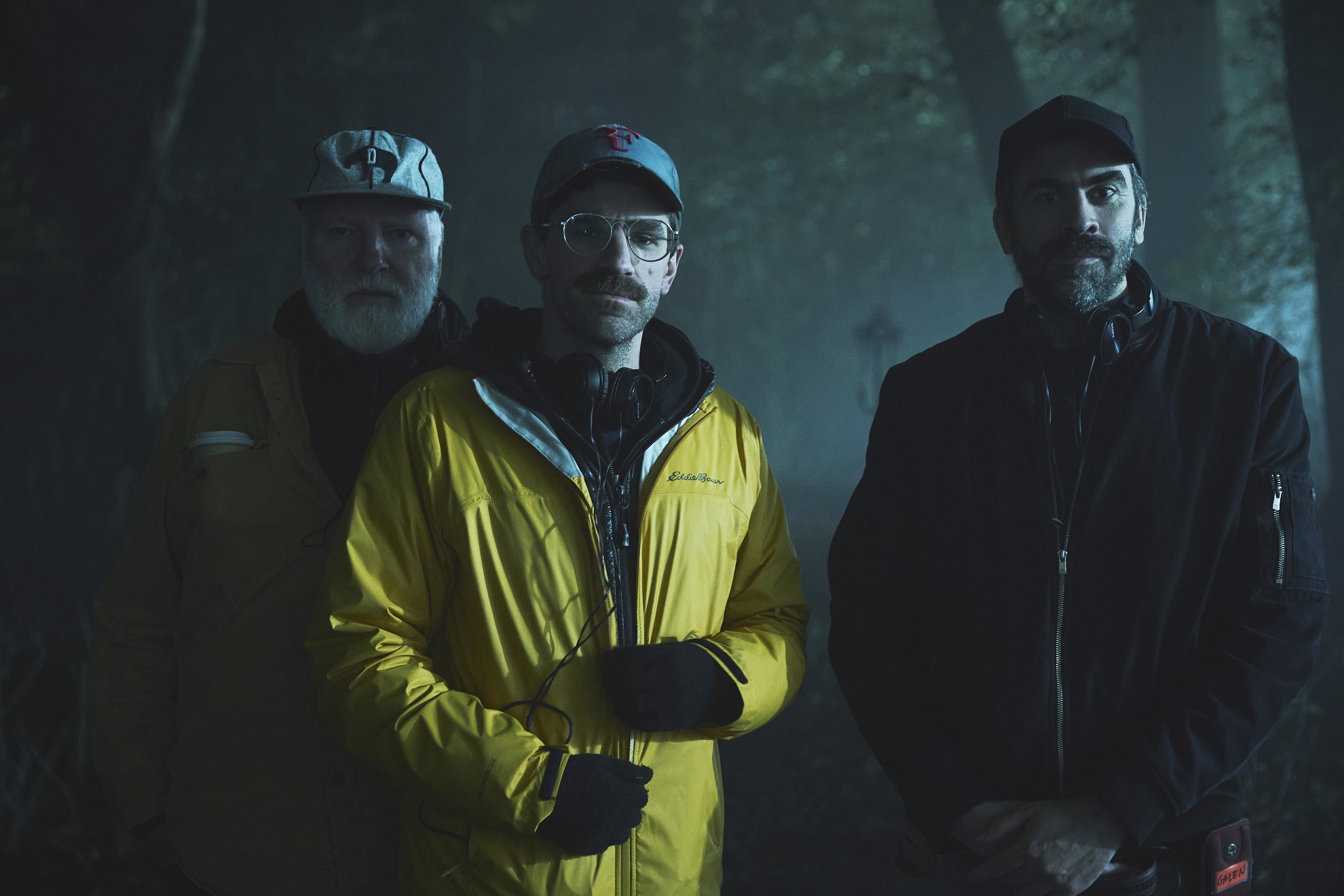 NICK HASTED: There's a lot in Rumours’ very first scene, when the politicians awkwardly shuffle into place for a photo-opportunity. It’s meant to symbolise global power, but they can’t even walk properly. Did observing that sort of behavior lay the seeds for Rumours?
NICK HASTED: There's a lot in Rumours’ very first scene, when the politicians awkwardly shuffle into place for a photo-opportunity. It’s meant to symbolise global power, but they can’t even walk properly. Did observing that sort of behavior lay the seeds for Rumours?
GUY MADDIN: Yeah, stuff like that. A little bit of pageantry, where they've gone to the trouble of building a dais for all the leaders to line up. It's very typical of summits each year. It really was nice in Cornwall [at the 2021 G7], when Boris Johnson was the host. They built a big fashion model boardwalk for them to walk out, and some sort of trophy display case at the end, like where action figures could line up. It's not avant-garde design ever - politicians don't want to come off as avant-garde! And by way of helping the actors get into this proper state of mind, we sent them YouTube clips of summit pageantry.
There’s a thing you’ve talked about in your films of things not being the usual scale, Guy – they’re too big, or too small.
MADDIN: You've read my rulebook!
I have. But those discrepancies work with these characters, too, in that they're officially big and important, but even in the midst of pageantry they're really…
MADDIN: Smaller than life? Yeah. Our President Wolcott seems to be living in the wrong end of the binoculars somehow.
Ursula von der Leyen and Justin Trudeau’s outlines can be discerned behind your German and Canadian leaders [Cate Blanchett as Chancellor Ortmann pictured below].
EVAN JOHNSON: Everyone says Angela Merkel, but it is Ursula. Ursula von der Leyen's Wikipedia entry is funnier. It has more outrageous biographical claims, like her going to live undercover in the UK, because the Red Army Faction was threatening her family, allegedly. It's got more bizarre intersections with history in it, and she’s a richer figure than Merkel. It's not like we are fans of any politicians for their politics, we chose them for this movie for the richness of their character, usually. And I guess we based our Canadian prime minister mostly on the actor who played him, Roy Dupuis, and whatever coincidences that lead to him seeming like Trudeau work. But it is fun to imagine that character [a manbun-sporting, brooding romantic and action hero] as Justin Trudeau's imaginary version of himself. He thinks he is like that, but isn't.
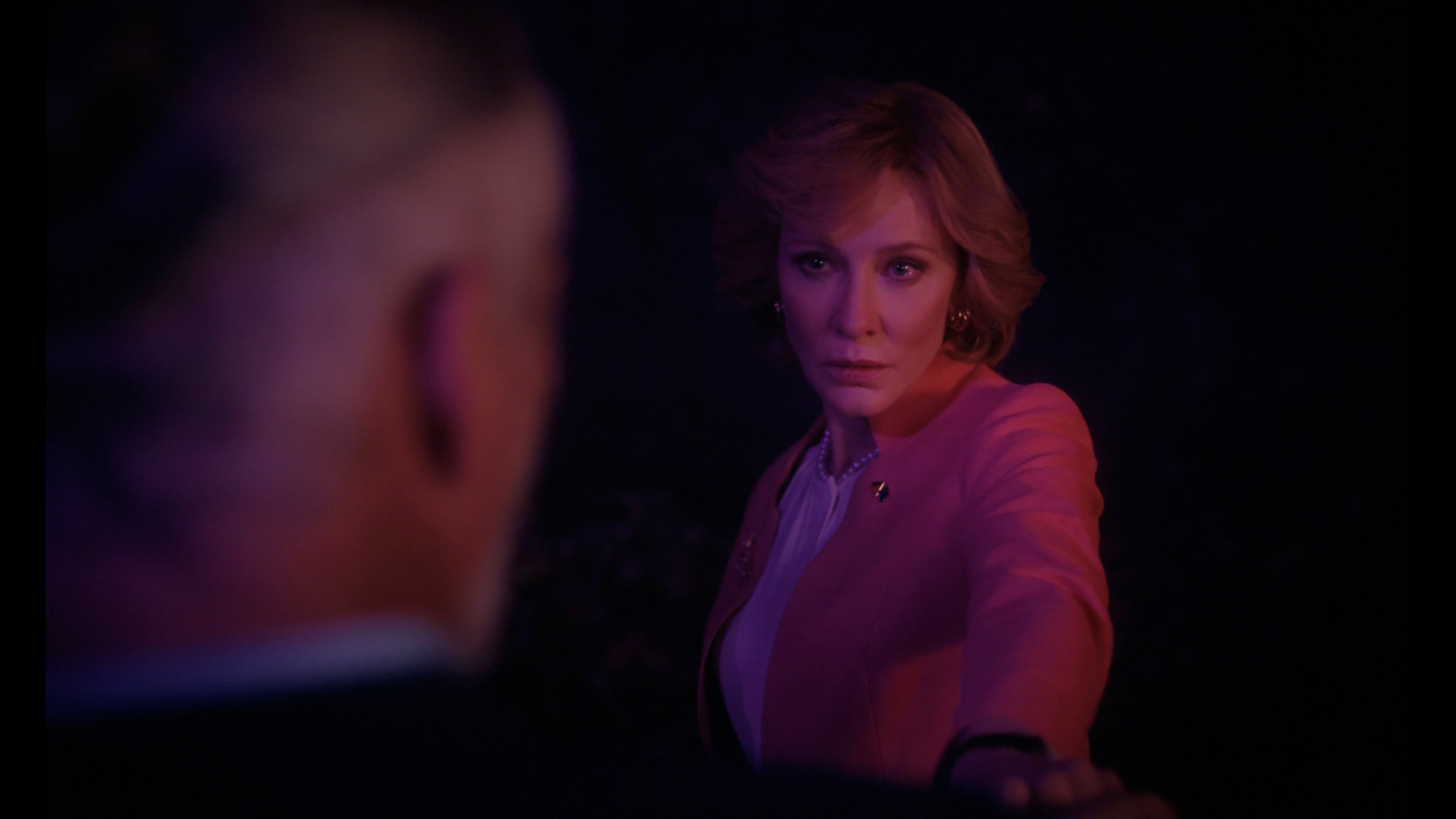 In the course of Rumours these world leaders become pitiable, if not pitiful. There’s a humaneness towards them, for all their disastrous qualities.
In the course of Rumours these world leaders become pitiable, if not pitiful. There’s a humaneness towards them, for all their disastrous qualities.
MADDIN: For all that, although we don't reveal much of their policies or ideologies, the odds are some of them are war criminals! I’d put my money on it.
EVAN JOHNSON: It's hard to write for any extended period of time and direct actors without becoming fond of the characters.
GALEN JOHNSON: Or identify with their situation of having to collectively write something together…
EVAN JOHNSON: There's a lot of us in them, I think.
Are there any world leaders past or present that you still fondly imagine are not the usual schlubs?
MADDIN: From my naive youth? Actually I believed in Pierre Trudeau when I was a kid. I was 12 when he got elected, but he seemed to be different. He wasn't promising to drain the swamp, but he hadn't been a career politician. He'd been a lawyer and he threw out the charm school rule book, which is pretty cool, especially in the Sixties. But he ended up settling into a career of political struggle just like everyone else.
EVAN JOHNSON: I was gonna say Mitterrand, but I don't even know. I remember finding all kinds of anecdotes from early in his career where he seemed like an arousing and exciting figure. And then he becomes the president of France and the compromises just become so odious. I dunno if there's anyone. Gordon Brown, anyone remember him?
Well, Gordon Brown, except when he was prime minister.
EVAN JOHNSON: Exactly. You become prime minister and then suddenly you're just trapped and you can't do anything.
MADDIN: I guess Barack Obama famously, just as soon as he became president…
GALEN JOHNSON: Yeah. Just ask the banks what to do.
Your leaders find themselves trapped in a sort of limbo, with an apocalypse licking at the film’s edges that’s left vague and undefined…
GALEN JOHNSON: Leaders are so self-absorbed that if there was an apocalypse going on, they might not even notice it…
MADDIN: There’ll always be an apocalypse looming. When I was a kid, it was the Cold War and nuclear apocalypse. And now, the crisis du jour is global warming, I guess. There are also other sorts, maybe it’s a world poly-crisis. It's on its way, but I'm vague on what exactly it’s gonna be, or when it's gonna happen. It's not gonna be pleasant, and it won't be instantaneous, the way, when I was a kid, everyone thought of Dr. Strangelove, with the bombs going off all at once. No, it'll slow-burn. It'll get ugly. It'll be multi-generational, probably.
In outline, Rumours sounds like a protest film or a straight satire on the inadequacy of responses to the climate crisis. But are you constitutionally unable to be so on the nose?
EVAN JOHNSON: I don't know if it's a principle or constitutional or if it was strategic, but we did think about whether a political satire that's direct and forceful would not somehow be subsumed into the same problem. We were experimenting with trying to make something that stands outside the problem somehow.
MADDIN: We never said anything about it. We just didn't want to. It's not something we enjoy watching.
EVAN JOHNSON: Well, I enjoy Armando Iannucci a lot, that's straight political satire, it’s policy-accurate and very detailed. But it's just not in our bones, I guess.
MADDIN: One of the comforts I had for many decades was setting things in some mythical past, which of course is alienating for a lot of people, but that was just because it takes a couple years to make a film. I didn't want the film to be stale and dated by the time it finally came out, so I was at least avoiding that by making things unmoored in time. But this is set in the present.
And yet for the duration of being in the forest, it seems similarly unmoored and mythical.
MADDIN: And that was a comfort to me.
And the German forest where the leaders get lost is the equivalent of people going away to sea in other cultures. It's where people have transformative adventures in German folk tales.
MADDIN: Yeah. And we're a big Teutonophiles when it comes to literature.
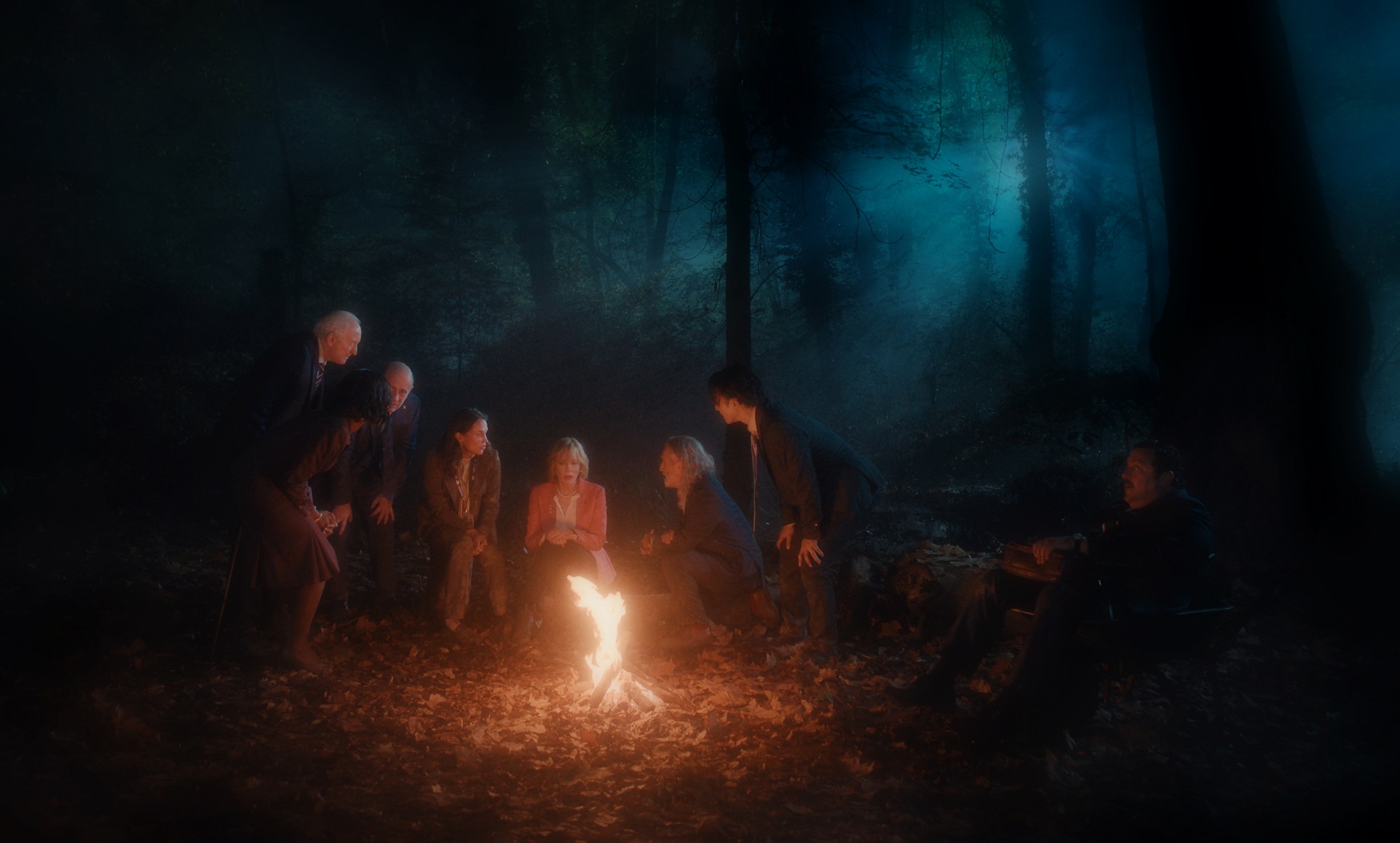 So how was it actually being in a forest at night?
So how was it actually being in a forest at night?
EVAN JOHNSON: It seemed like you enjoyed being in the forest more when we were just there at night shooting than when we were scouting.
MADDIN: I hated location scouting, because I'd spent my entire career not shooting that way. I loved the wisdom of Hitchcock getting up outta bed and putting his shoes on and tying his laces and going to the studio, shooting and never worrying about the weather forecast. And location scouting is arduous. Whereas once shooting starts, it's a little bit magical. The fog machines get going. It's night, with the moon, the temperature, the breath, and not just your actors and your characters but you get lost in the forest every now and then, the fog machine blasts far too much fog, and you have to feel your way home, tree trunk by tree trunk, face by face, until you’ve made your way to the bathroom or the set, going by voices’ audibility and the distance getting closer. I really love getting lost.
Did that literal dislocation help the film?
MADDIN: Yeah, the atmosphere and disorientation that's on the page and on the screen was even more present on the set, because we'd have to actually wait for the wind to pick up and clear the disorientation away so that we could shoot.
Have you been won over to locations’ possibilities?
MADDIN: Actually, I'm far more open to it now.
EVAN JOHNSON: Now that we know we can make locations look like cheap sets, we're more comfortable!
MADDIN: We’re ready to go into Monument Valley and make it look like a bunch of papier-mâché hills. Yeah, I totally went over to it. Now that I've seen the process all the way through, I'm even ready to be more pupil-dilated and sitting upright properly in the location scouting van.
EVAN JOHNSON: But it'd be nice to shoot in a studio.
MADDIN: Oh, yeah. Just going to the same place and shooting in my bathrobe and slippers, that's for me. I'll keep the bathrobe closed. It won't be the Hollywood bathrobe…
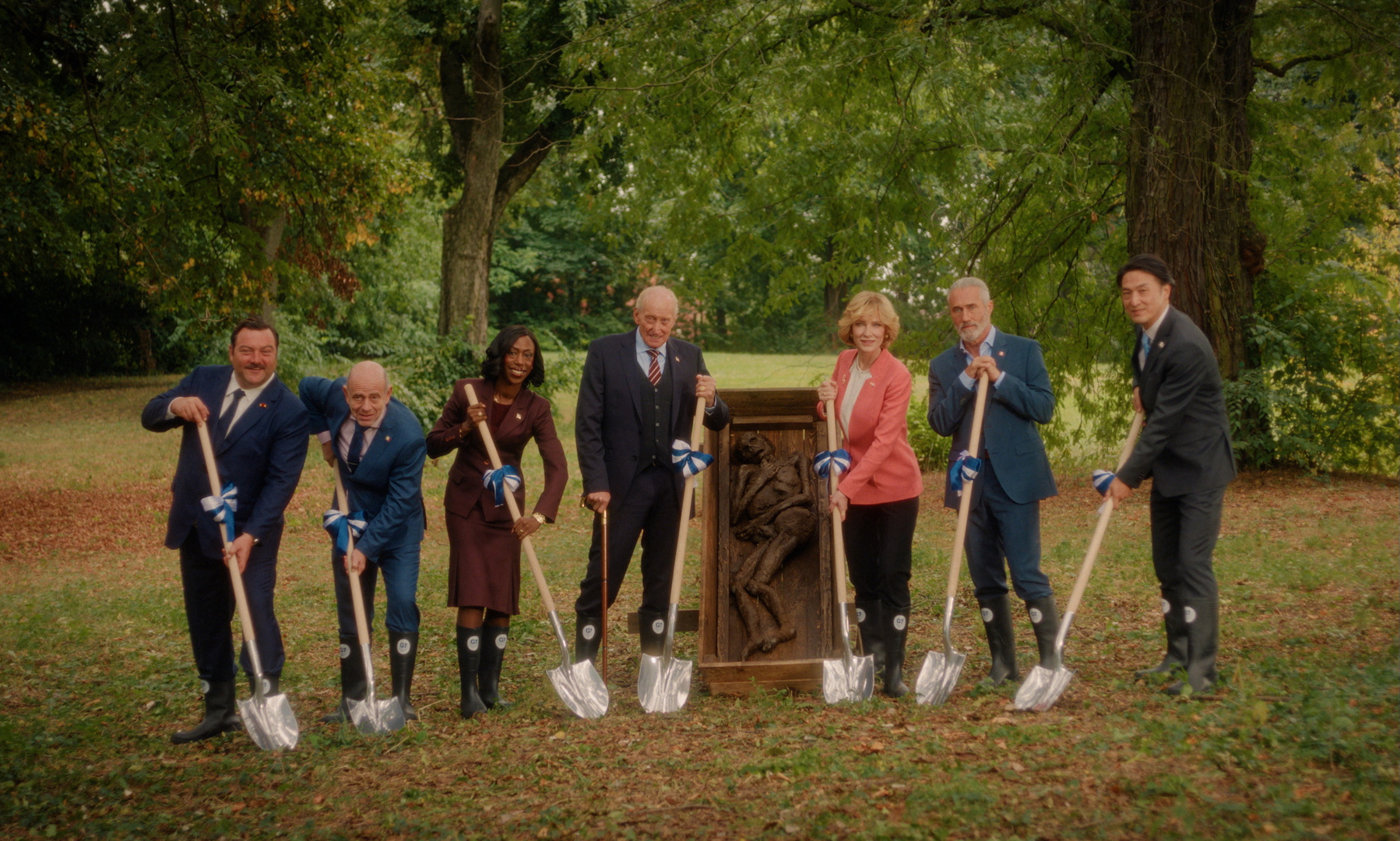 When in the course of your research you happened upon the dickless Bog people leaders, pictured above centre, was this quite a gift?
When in the course of your research you happened upon the dickless Bog people leaders, pictured above centre, was this quite a gift?
MADDIN: Yeah. Right on a silver platter.
EVAN JOHNSON: There's a famous book by a Danish historian Peter Glob called The Bog People. And somewhere in there is the fact that some bog people were slaughtered leaders who’d been sacrificed or ritualistically slaughtered for their failure to encourage better crops. I was briefly enamored with the idea, and I've been told it's impractical, that after your Prime Minister or President term is up, we ritualistically slaughter them. Dump them in the river or whatever! It seemed like a cool idea to me…
It doesn’t seem the best way to get the best talent to put themselves forward…
EVAN JOHNSON: But they're not anyway. It's attracting a certain kind of person who just wants to be in charge. David Cross said when you’re the American president, you get to be the boss of everything.
Did you find that this digitally crisp film with major stars arrived at different forms of artifice from your previous work?
MADDIN: There's a million types of artifice and art. In filmmaking, a lot of people can't see melodrama in something that's modern, they think melodrama is something from decades ago.
GALEN JOHNSON: It’s every Oscar nominee…
MADDIN: Yeah, exactly. And it's also the way we recognize narrative, and make narrative sense of things. Not every film is melodramatic, Albert Serra's not the most melodramatic filmmaker, but realism has artifice. Life isn't color-corrected or diffused or shot even…
GALEN JOHNSON: Or scripted…
MADDIN: And I like the artifice that's rehearsed and crisply edited. So there's artifice in everything. You know, we're not watching security camera footage of the real crisis in Rumours. But I love the way Evan's dialogue sings, so that geopolitical speak gets airborne pretty quickly. My ear is better for it now after years of watching and making movies, and it's consistent from the beginning of the movie till the end. It takes you places, it gets airborne and then it drifts around for a while, and then it just heads straight for the suicide punchline. I love where it goes and how it levitates so effortlessly. To me it's really beautiful, it reminds me of the poetry of John Ashbery or something like that, it's a literary thing. It's not bookish, it's not Merchant and Ivory, but it produces literary thrills in me, the same things that reading a great novel or poem produces, that little Nabokovian tingle at the base of my skull. And that's artificial.
Evan, when you are constructing these flights that Guy describes, in this case were you absorbing political speeches for their bureaucratic talk? Was that the plain mulch of it?
EVAN JOHNSON: I read some G7 statements for this, for the particular language of statements and that kind of thing. I don't really know where the tone of the dialogue came from, except from within. I skim newspapers like The Guardian a little bit. I am a mimic as a writer usually, I don't think I have a distinct style, so it's easy to just take the talk that's around and repurpose it. It came out without much thought, really, just brain off, see where the characters are going. And some of the punchier ideas in the movie are things the three of us discussed, so I had gags to hit and speeches to lead towards.
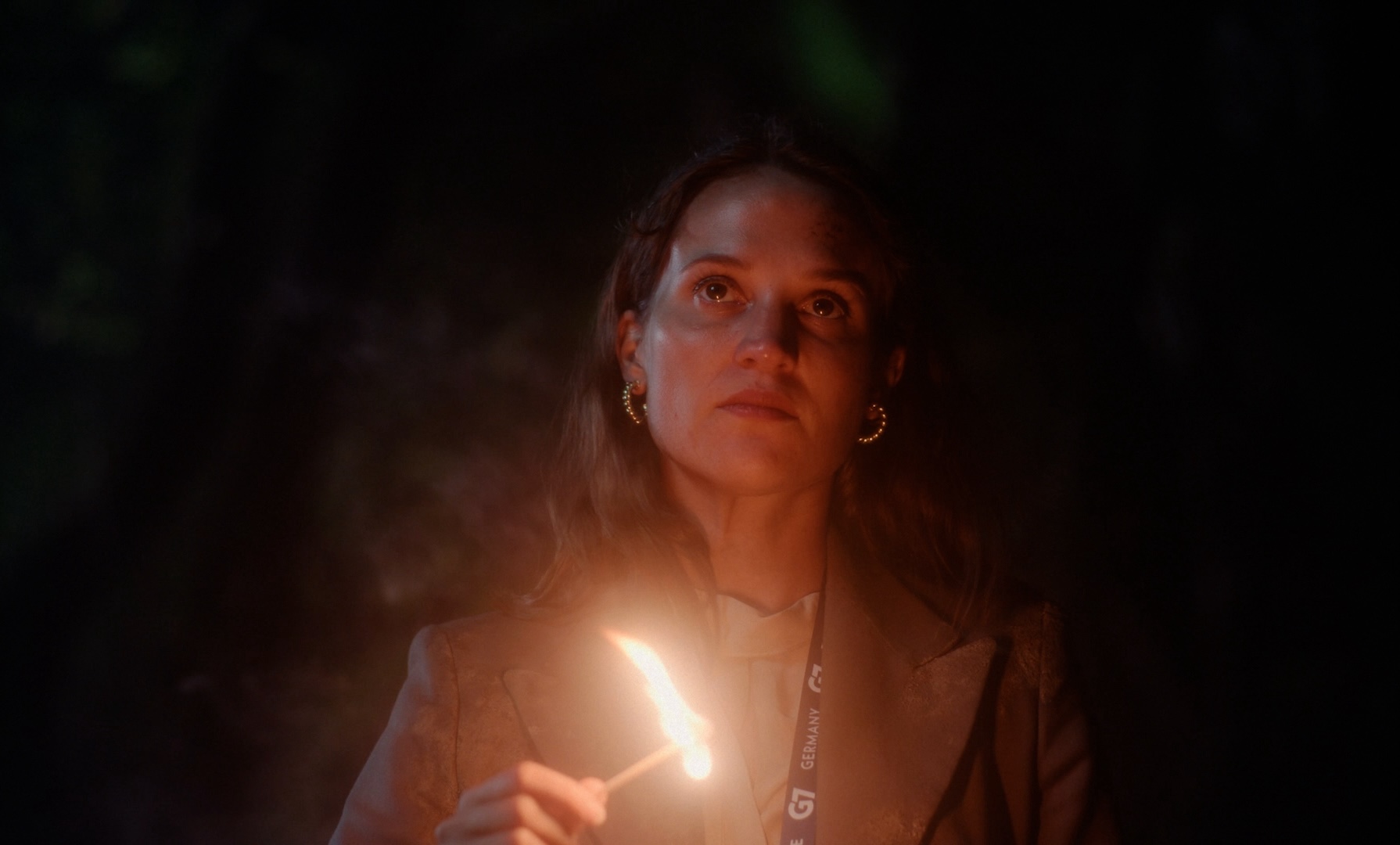 Along with locations and big stars (Alicia Vikander pictured above), this film steps away from so many elements of your usual MO, Guy. Was that a side-effect of the nature of the project as it was developed that you happily bought into? Or were you already looking to do that?
Along with locations and big stars (Alicia Vikander pictured above), this film steps away from so many elements of your usual MO, Guy. Was that a side-effect of the nature of the project as it was developed that you happily bought into? Or were you already looking to do that?
MADDIN: We were writing other things. I felt maybe I'd used up, like just strip-mined my personal biography. And I felt I needed to live a few more years to accumulate some little sapling perversions that can sprout into sturdy sequoias of untreatable pathologies! And I've accumulated some, I've been keeping a metaphorical notebook on my own life lately and saving up enough for another feature or two, somewhere down the line. With our last film The Forbidden Room [2014, pictured above], which was very structure-obsessive and more interested in the game of storytelling, there were some autobiographical borrowings in there. But I was pretty cautious about going any further inward for a while. It served me well to strip-mine, I did it as quickly and ruthlessly as possible without concern for the villagers! But I consciously wanted to try to expand my reach. These guys have made it possible for me to do so, because I couldn't and wouldn’t have done this alone. I love working with these guys. We've been doing it for 14 years now. We each have our manias, but we think together.
And with those 14 years that you two have been in on this, did you also feel that it was time for a change?
GALEN JOHNSON: We have an idea for a screenplay, and then everything comes out of that. So we had an idea for this movie, and it made sense to not shoot it like it was a nine-part talkie from the 1930s. I would never say we’re renouncing that type of filmmaking.
EVAN JOHNSON: No, I think Guy's more likely to renounce it, because he's had more experience. You've done it for longer than us, we don't want to change you – you’re a visionary auteur, and now we come along!
MADDIN: The Forbidden Room did seem to be the final word.
EVAN JOHNSON: That was certainly a climax of some kind.
MADDIN: But I don't know. I've toyed with the idea of just making ultra-low budgets if I have to by myself - self-pleasuring essay films or something like that. Then the style would be determined by whatever I choose to talk about.
- Read more film reviews and features on theartsdesk

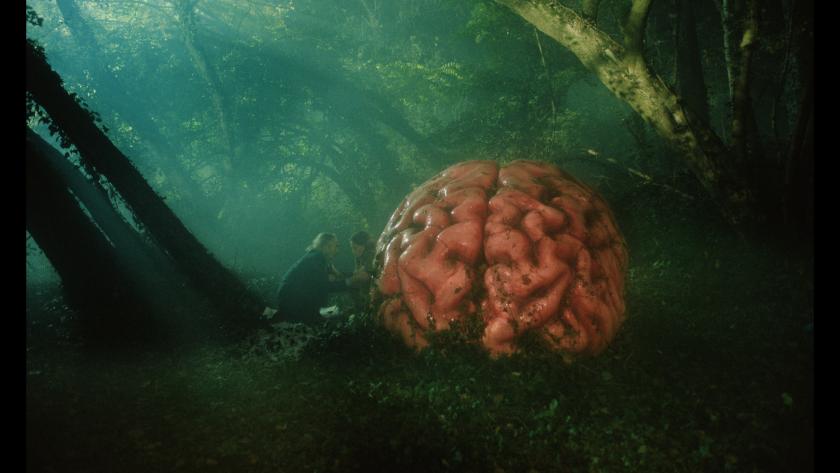







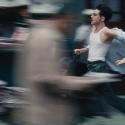





Add comment